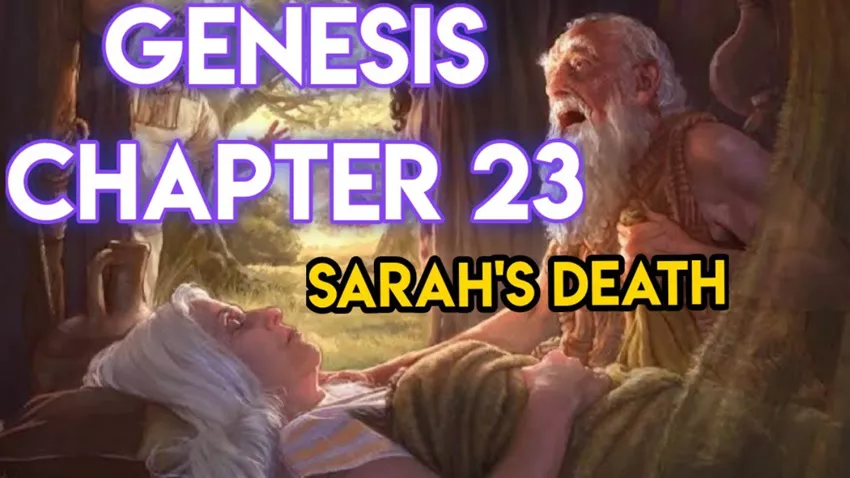Genesis Chapter 23 Summary
In Genesis 23, we read about the death of Sarah, Abraham‘s wife, at the age of 127. Abraham mourns her passing and seeks to find a burial place for her. He approaches the Hittites, requesting a piece of land to bury Sarah. Ephron, a Hittite, offers to give Abraham a cave at Machpelah. However, Abraham insists on paying for the land. After negotiation, Abraham purchases the field and the cave for 400 shekels of silver. This becomes the first piece of land Abraham owns in Canaan, where he buries Sarah, honoring her life.
Bible Genesis Chapter 23
Welcome to read Genesis Chapter 23. Here is the list of Genesis Chapter 23:
What Does Genesis Chapter 23 Teach us?
Genesis 23 is a significant chapter in the Bible, not only because it narrates the death of Sarah, Abraham’s wife, but also because it highlights several spiritual and practical lessons. As Christians, we can draw from this chapter the importance of faith, the value of integrity, and the significance of God‘s promises. Here are some key teachings from Genesis 23:
1. The Reality of Death and Mourning
The chapter begins with the death of Sarah at the age of 127. Abraham mourns for her, demonstrating the natural response to loss and the human need for grief. Even though Abraham was a man of great faith, he experienced sorrow. This reminds us that grief is not a sign of weak faith but a natural part of life. In mourning, we acknowledge the value of those we have lost.
The Bible repeatedly shows that it is normal for believers to mourn, but we mourn with hope. In 1 Thessalonians 4:13, Paul encourages Christians not to grieve “like the rest of mankind, who have no hope.” Abraham’s grief for Sarah is sincere and heartfelt, but his actions afterward demonstrate his continued trust in God’s promises.
2. Faith in God’s Promises
Genesis 23 also shows Abraham’s unwavering faith in God’s promises, particularly the promise that his descendants would inherit the land of Canaan (Genesis 17:8). Although he had not yet seen the full realization of this promise, Abraham acted in faith by securing a burial place in the very land God promised him.
When Sarah died, Abraham did not return to his original homeland to bury her. Instead, he sought a permanent resting place in Canaan. This act was symbolic of his belief that God’s promises would be fulfilled. For Abraham, purchasing land in Canaan was a declaration of his trust in God’s covenant. This challenges us as Christians to live with a forward-looking faith, trusting in God’s promises even when they are not yet fully realized.
3. The Value of Integrity in Our Dealings
The negotiation between Abraham and the Hittites provides an example of integrity and honesty in business dealings. Abraham was well-respected among the Hittites, as evidenced by their willingness to give him the land for free. However, Abraham insisted on paying the full price for the land, showing that he did not want to take advantage of the situation or incur any obligations.
This teaches us that as believers, we are called to act with integrity in all our transactions. Abraham’s refusal to accept a gift and his willingness to pay 400 shekels of silver (a significant amount) reflects his desire to live righteously and above reproach. Proverbs 11:1 reminds us, “The Lord detests dishonest scales, but accurate weights find favor with Him.” Abraham’s example of honesty and fairness sets a high standard for Christians in all aspects of life.
4. Preparation for the Future
The purchase of the cave of Machpelah was not just for Sarah; it was a future investment for Abraham’s family. This burial site would later serve as the final resting place for Abraham, Isaac, Rebekah, and Jacob. Abraham was making long-term preparations, showing wisdom and foresight.
This foresight is something that Christians can apply today. While we are called to trust God for our future, we are also called to plan wisely. In the same way that Abraham purchased a permanent burial site, we should seek to prepare for the future in both practical and spiritual ways, understanding that our actions today affect future generations.
5. God’s Faithfulness and Covenant Fulfillment
Ultimately, Genesis 23 underscores God’s faithfulness in fulfilling His promises. Although Abraham only purchased a small piece of land, it was a beginning—the first step in the fulfillment of God’s promise to give his descendants the entire land of Canaan. The cave at Machpelah would become a significant family burial site, anchoring Abraham’s family in the promised land for generations to come.
This reminds Christians of God’s unfailing faithfulness. Even when we see only small beginnings, we can trust that God will bring His promises to completion. Philippians 1:6 reassures us that “He who began a good work in you will carry it on to completion until the day of Christ Jesus.”
Related topics:


